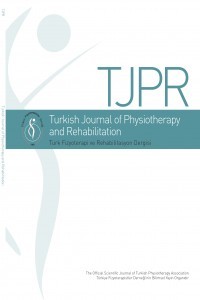ÜLKEMİZDE FİZYOTERAPİSTLERİN “İŞLEVSELLİK, YETİ YİTİMİ VE SAĞLIĞIN ULUSLARARASI SINIFLANDIRMASI (ICF)” KONUSUNDA BİLGİ VE FARKINDALIKLARI
Fizyoterapistler, İşlevsellik, Yeti Yitimi ve Sağlığın Uluslararası Sınıflandırması, Rehabilitasyon, Sonuç Değerlendirmesi, Terapi
AWARENESS AND ATTITUDES OF PHYSIOTHERAPISTS TOWARDS "INTERNATIONAL CLASSIFICATION OF FUNCTIONING, DISABILITY AND HEALTH (ICF)" IN TURKEY
Physical therapists, ICF, Rehabilitation, Outcome and process assessment (health care), Treatment,
___
- 1. WHO International Classification of Functioning, Disability and Health. Genava: World Health Organization;2001.
- 2. Üstün TB, Chatterji S, Bickenbach J, Kostanjsek N, Schneider M. The International Classification of Functioning, Disability and Health: a new tool for understanding disability and health. Disability and rehabilitation. 2003;25(11-12):565-571.
- 3. Perenboom RJ, Chorus AM. Measuring participation according to the International Classification of Functioning, Disability and Health (ICF). Disability and rehabilitation. 2003;25(11-12):577-587.
- 4. Özberk ZN, Karaduman A. İşlevsellik, Yetiyitimi ve Sağlığın Uluslararası Sınıflandırılması – ICF’in Fizyoterapi Rehabilitasyonda Kullanımı. In: Karaduman A, Tunca Yilmaz Ö eds. Fizyoterapi ve Rehabilitasyon: Genel Fizyoterapi Ankara: Pelikan Yayınevi; 2016: 63-76.
- 5. Stucki G, Cieza A, Melvin J. The international classification of functioning, disability and health: A unifying model for the conceptual description of the rehabilitation strategy. Journal of rehabilitation medicine. 2007;39(4):279-285.
- 6. Karaduman AA. ÖZ. İşlevsellik, Yeti Yitimi ve Sağlığın Uluslararası Sınıflandırılması – ICF’in İnme Rehabilitasyonunda Kullanımı. In: Karaduman A, Aksu Yıldırım S, Tunca Yilmaz Ö, eds. İnme Sonrası Fizyoterapi ve Rehabilitasyon, Ankara Pelikan Yayınevi; 2016:207-233.
- 7. Akio, T. O. K. U. N. A. G. A. The attempt of the practical application of International Classification of Functioning, Disability, and Health (ICF) as a tool for collaboration among various professionals: A perspective on its applicability to “individualized educational support plan”. tin NISE Bulletin, 2008;1(9):1-26.
- 8. Stamm, T. Medical versus bio-psycho-social model: possible reasons why the ICF is hardly used in Austria from an occupational therapy perspective. World Federation of Occupational Therapists Bulletin, 2009:59(1), 70-75.
- 9. Kahraman, T., Çekok, F. K., Üğüt, B. O., Keskinoğlu, P., & Genç, A. One-Year Change in the Physical Functioning of Older People According to the International Classification of Functioning Domains. Journal of geriatric physical therapy 2019:15. doi: 10.1519/JPT.0000000000000234.
- 10. Brandt, C., & van Vuuren, E. C. J. An International Classification of Function, Disability and Health (ICF)-based investigation of movement impairment in women with pelvic organ prolapse. The South African Journal of Physiotherapy, 2019:75(1).
- 11. Hsu, T. H., Liou, T. H., Chou, K. R., Chi, W. C., Yen, C. F., Liao, H. F., & Tseng, I. J. Large-scale assessment of function and disability in patients with parkinson’s disease using the functioning disability evaluation scale-adult version. International journal of environmental research and public health, 2018:15(12), 2788.
- 12. Fresk, M., Brodin, N., Grooten, W. J., Joseph, C., & Kiessling, A. Mapping a measure of physical ability for persons with long-term musculoskeletal pain to the ICF and ICF Core Sets. European journal of public health, 2019:29(2), 286-291.
- 13. Alcantara, M. A., De Souza, R. A., De Oliveira, F. A., & Pinhal, K. C. Using the ICF framework to evaluate the effects of environmental factors on physical disability among people with diabetes mellitus. Physiotherapy theory and practice, 2018:1-8.
- 14. Burak, M., & Kavlak, E. Investigation of the relationship between quality of life, activity-participation and environmental factors in adolescents with cerebral palsy. NeuroRehabilitation, (Preprint), 2019:1-11.
- 15. Angeli, J. M., Schwab, S. M., Huijs, L., Sheehan, A., & Harpster, K. ICF-inspired goal-setting in developmental rehabilitation: an innovative framework for pediatric therapists. Physiotherapy theory and practice, 2019:1-10.
- 16. Huang SW, Lin LF, Chang KH, Escorpizo R, Liou TH. Development of a comprehensive core set from the international classification of functioning, disability and health for return to work among patients with stroke through delphi-based consensus. Eur J Phys Rehabil Med 2020:23.
- ISSN: 2651-4451
- Başlangıç: 1974
- Yayıncı: Türkiye Fizyoterapistler Derneği
Nazlı Büşra CİĞERCİOĞLU, Hande GUNEY DENİZ, Ezgi ÜNÜVAR, Filiz Fatma ÇOLAKOĞLU, Gül BALTACI
VÜCUT FARKINDALIĞI ANKETİ’NİN TÜRKÇE UYARLAMASI: GEÇERLİK VE GÜVENİRLİK ÇALIŞMASI
ADOLESAN TENİSÇİLERDE KALÇA KAS KUVVETİ VE FEMORAL ANTEVERSİYON AÇISININ BİLATERAL KARŞILAŞTIRILMASI
Sümeyya YALKI, Hande GUNEY DENİZ, Fırat TAN, Fatma Filiz ÇOLAKOĞLU, Gül BALTACI
BAKIMVEREN FONKSİYONEL KULLANIM ANKETİNİN TÜRKÇE VERSİYONUNUN GEÇERLİK VE GÜVENİRLİĞİ
Ayşe YILDIZ, Ramazan YILDIZ, Erkan EROL, Umut APAYDIN, Derya GÖKMEN, Bülent ELBASAN
FİZYOTERAPİST-HASTA İLETİŞİMİNİN İNCELENMESİ: NİTEL ÇALIŞMA
Sercan YILLI, Bensu SÖĞÜT, Serkan KALMAZ, Faruk ALTAY, Sualp GÜNDÜZ, Damla ARSLAN, Ebru Gül SEZİK, Elif TURGUT
PRİMER DİSMENORESİ OLAN VE OLMAYAN KADINLARDA OMURGA POSTÜR VE MOBİLİTESİNİN KARŞILAŞTIRILMASI
Ayşenur KARAKUŞ, Derya ÖZER KAYA, Şeyda TOPRAK ÇELENAY
Sezen KARABÖRKLÜ ARGUT, Ela TARAKCI
Kıvanç DELİOĞLU, Akın ÜZÜMCÜGİL, Ebru ÖZTÜRK, Mintaze KEREM GÜNEL
